#powered by the apocalypse
Explore tagged Tumblr posts
Note
Hiya, I was just wondering if there were any updates on your TMA TTRPG project because it seems super fun and I am gnawing at the bars of my cage to hear more about it :D

Thanks for asking about it. I unfortunately never found the time to test the system, but I think it’s at a point where people can at least look at it, so here’s my google doc of the PbtA heavily based on Monster of the Week tma system
#tma#the magnus archives#the magnus institute#the magnus pod#magpod#tma ttrpg#mag ttrpg#the magnus archives ttrpg#ttrpg#powered by the apocalypse#pbta#monster of the week#motw
1K notes
·
View notes
Text
Powered by the Apocalypse game where the only move is "Fall To Your Knees, Rend Your Clothes And Lament Your Fate"
981 notes
·
View notes
Text
Pictures that make a "the only TTRPG I know is D&D"-person spontaneously combust:
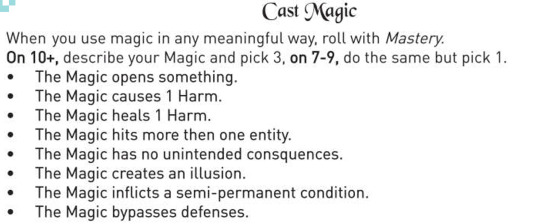
This is the entirety of the magic mechanics in the game "Interstitial: Our Hearts Intertwined"
I'm keeping this post for the next time I hear someone say they don't want to try a new game because it's too hard to learn a new system.
#d&d#dnd#dungeons & dragons#dungeons and dragons#ttrpg#tabletop rpg#pbta#powered by the apocalypse#interstitial our hearts intertwined#interstitial
841 notes
·
View notes
Text
Have you played APOCALYPSE WORLD ?
By Vincent & Meguey Baker

Something’s wrong with the world and I don’t know what it is.
It used to be better, of course it did. In the golden age of legend, when there was enough to eat and enough hope, when there was one nation under god and people could lift their eyes and see beyond the horizon, beyond the day. Children were born happy and grew up rich.
Now that’s not what we’ve got. Now we’ve got this. Hardholders stand against the screaming elements and all comers, keeping safe as many as they can. Angels and savvyheads run constant battle against there’s not enough and bullets fly and everything breaks. Hocuses gather people around them, and are they protectors, saviors, visionaries, or just wishful thinkers? Choppers, gunluggers, and battlebabes carve out what they can and defend it with blood and bullets. Drivers search and scavenge, looking for that opportunity, that one perfect chance. Skinners and the maestro d’ remember beauty, or invent beauty anew, cup it in their hands and whisper come and see, and don’t worry now what it will cost you. And brainers, oh, brainers see what none of the rest of us will: the world’s psychic maelstrom, the terrible desperation and hate pressing in at the edge of all perception, it is the world now.
And you, who are you? This is what we’ve got, yes. What are you going to make of it?
Apocalypse World is the award-winning and critically acclaimed game that launched the Powered by the Apocalypse school of rpg design.
333 notes
·
View notes
Text
L'Yom Vayom: A Jewish TTRPG
The Complete Edition of L'Yom Vayom, my TTRPG about being Jewish, has just been released! You can grab it at the link below:
Please note that the rules require that the MC be Jewish. Please also note that it might be a pretty tough game to play.
#jewish#jumblr#judaism#antisemitism#rpg#ttrpg#roleplaying#roleplay#tabletop#tabletop roleplaying#honey heist#powered by the apocalypse#pbta#game design#indie#indie games#indie ttrpg
310 notes
·
View notes
Text
Why I Dislike PbtA Games, and How Eureka: Investigative Urban Fantasy is Their Opposite

@tender-curiosities

It is no secret that I hate PbtA games.
Though due to a recent misunderstanding regarding another post, I’m going to preface this post by saying that this is going to be a very opinionated post and
I do not seriously think that PbtA games are inherently bad, though I may sometimes joke about this.
While I do often question the taste of people who make and play PbtA hacks, I do not think poorly of their moral character.
While I am going to call for PbtA to be used less as a base for games in the future, I’m not saying that the whole system and all games based on it should be destructified. It’s good for what it’s good for, but unless you’re doing that, I really think you should use something else.
Now that that is out of the way, here’s what I have to say about it.
My first experiences with PbtA games were pretty rough. Monster of the Week was not the first, but it was one of the first ‘indie’ TTRPGs I played after having previously played mostly only D&D3.5e and 5e. I really appreciated that the use of 2D6 over a D20 meant that the dice results would be more predictable, and I really liked the various “classes” I was seeing. (At this time, I didn’t really understand that they weren’t really “classes” at all, though I think I can be forgiven for this because many people, even people who like PbtA games, still talk like “classes” and “playbooks” are interchangeable.)
I was very enthusiastic to play, until it came time to start actually “making” a character, and found that I couldn’t “make” a character. I wanted to make a nuanced, three-dimensional PC who was simultaneously stereotype-affirming and stereotype-defying, with a unique backstory and dynamic with the other characters—but when I went to actually fill out the character sheet for basically any “class”, I found that most of the backstory and most of the personality for my character was being set for me by the playbook. It felt like the only thing about the character I really had a say in was their name, and that two PCs of the same playbook would actually turn out to be almost identical characters. At the time, I thought this was very restrictive and very bad design.
Later, now that I understand the design intent behind it, I still think of it as very restrictive, but I think of it as very bad design for me, not inherently bad.
When I play a TTRPG, I want more freedom in who my PC is. That doesn’t mean I want less rules, in fact having more rules can often increase freedom, but that’s a different post. I want to create original, unique characters, that I won’t see anywhere else. If it’s a class-based system, I want that class to barely touch the details of my character’s backstory or personality, so that I can come up with something original and engaging for why and how this “Fighter” fights. This means that two level-1 Fighters, despite having almost the same mechanical abilities, will potentially be very different people.
PbtA games don’t let you do that. In a lot of PbtA games, you’re not playing your own original character, you’re playing someone else’s character, that every other player that has picked up the same playbook before you has played. It’s more like “character select” than “character creation.” I think I could liken it to playing Mass Effect or The Witcher. Every player may pick a few different dialogue choices in those games that change the story, but we’re still all playing Shepherd or Geralt. No one is going to experience a new never-before-seen story in Mass Effect or The Witcher, which is very much a factor of them being video games and not TTRPGs, and therefore limited to the amount of code, writing, and voice-acting that can go into them.
This anonymous asker who sent a message to @thydungeongal seems to feel pretty similarly to me about PbtA games, and @thydungeongal's response is a very good response about how people find this appealing.
I have more respect for PbtA now than I did, but I still don't like it because to me it seems to play so much against what I consider to be the strengths of TTRPGs as a medium, much like how video games like The Last of Us and David Cage games play against the strengths of the medium of video games, and I will never like it. But other people clearly do, so to each their own.
Then another reason I don’t like it is because I think it’s oversaturating the TTRPG space. I’ve referred to PbtA before as “indie D&D5e”, and i do think that’s a reasonable comparison, because in much the same way that you always hear “D&D5e is a system that can do everything”, I think a lot of people seem to be under the impression that the PbtA system is a system that can do anything. It’s kinda the système du jour for indie TTRPGs right now, and many iterations of it make it clear that many designers do not consider how PbtA differs from more traditional TTRPGs, and how it is specialized for different types of TTRPG gameplay. Just like how I feel PbtA isn’t playing to certain important strengths of TTRPGs, I think that many—maybe even most—PbtA hacks don’t play to the strengths of PbtA. But this isn’t really PbtA’s fault, that comes down to any individual indie TTRPG developer on a case-by-case basis. And the cure for that is something I’m always saying: If you are going to be a writer, you have got to read lots of books. If you are going to be a director, you have got to watch lots of movies. If you are going to be a video game developer, you have got to play lots of video games. And if you are going to be a TTRPG designer, you have got to read and play lots of TTRPGs. That and you have to understand that TTRPGs are specialized. Even "agnostic" systems like PbtA are somewhat specialized, and therefore might really not be a great fit for the game you’re trying to make.
That and, to get more subjective again, there’s like an ocean of them, and I don’t even like the ones that are actually good.
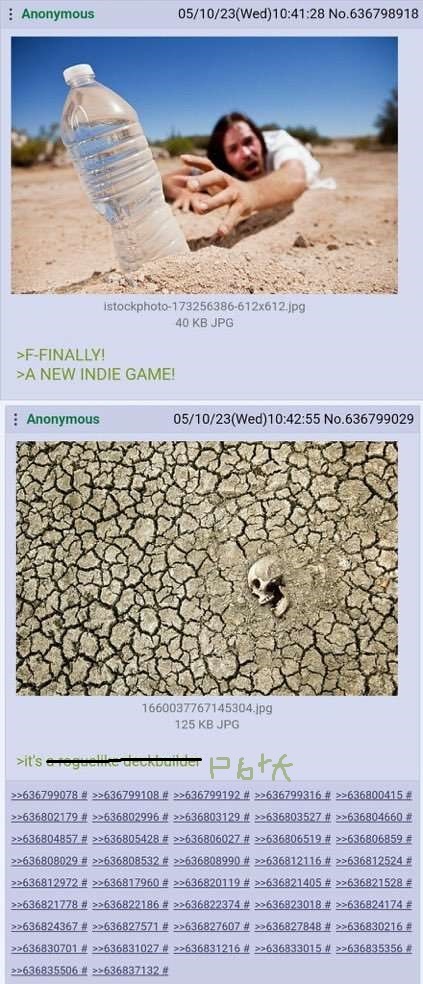
Now that I’ve talked about how I don’t like PbtA games, I’m gonna talk about a game I do like: Eureka: Investigative Urban Fantasy. Obviously, I like it because I’m the lead writer for it, but I would also like it even if I wasn’t the lead writer for it, because it’s just my kinda game. Eureka is the opposite of a PbtA game. I wrote it to play to what I feel are the strengths of the TTRPG medium.
Eureka’s character creation uses personality traits as a mechanical element of the character, but it does so in a deliberately freeform way. You build your character’s personality out of a list of traits, so who your character is is very much linked to what your character can do, but we aren’t just handing you a pre-made character.
Eureka is designed to incentivize organic decision-making by the PCs, most often by the mechanics of the game mirroring the world they live in. Every mechanic aims to create situations wherein “what will the PC do next?” is a question whose answer can be predicted - it doesn’t need to be ordained by a playbook.
One of my favorite examples of this is, rather than a “Fear Check” forcing the PC to run away if they fail, or “Run Away from Danger” being a “Move” on their character sheet, Eureka opts for the Composure mechanic. The really short version is that one of the main things that lowers a PC’s Composure is encountering scary stuff, and the lower a PC’s Composure, the more likely they are to fail skill checks, and the more likely they are to fail skill checks, well, the less brave they and their player probably feel about them standing up to this scary monster. So if the PC has low Composure, they are more likely to choose to run away. The lower their Composure, the better idea that will seem.
This system really really shines when it comes to monster PCs in Eureka. Most monsters benefit a lot more from having high Composure, but have fewer ways to restore Composure than mundane PCs. Their main way to restore their Composure is by eating people. The rulebook never says “your monster PC has to eat people”, but more likely than not, they’re going to be organically steered towards that by the game and world itself. Sure, they could decide to be “one of the good ones”, and just never eat people, just like you reading this could decide to stop eating food. You technically could, but when your body starts to fail, how long would you? (This is a big part of the themes of Eureka and what it has to say about crime, disability, mental illness, and evil. People don’t just arbitrarily do bad things, it is often their circumstances that leads them down that path until they see little choice for themselves in that matter, and “harmful” people are still just as deserving of life as people who “aren’t harmful”, but that really deserves its own post.)
It has been said that Eureka: Investigative Urban Fantasy actually arrives at much the same end as the PbtA game Monsterhearts, and I actually don’t disagree, but it gets there from an entirely different starting point and direction. The monster PCs in Eureka are very likely to eat people and cause drama, but it won’t be because they have “Eat People and Cause Drama” as a “Move” on their character sheet.
Monsters in Eureka have a lot of abilities, which they can use to solve (and create) problems as the emergent story emerges organically.
(Oh and Eureka is about adult investigators investigating mysteries, and sometimes those investigators are monsters, not about monster kids in high school, to be clear. The same “end” that Eureka and Monsterhearts reach is that of the monsters being prone to cause problems and drama due to the fact that they are monsters, though this isn’t the sole point of Eureka, just one element of it.)
You can pick up the free shareware version of this game from the download link on our website, or the full version for $5 from our Patreon.
And don’t forget, Eureka is fundraising on Kickstarter starting on April 10th, 2024! We need your support there most of all, to make sure we hit our goals and can afford to make the best version of Eureka we can make!
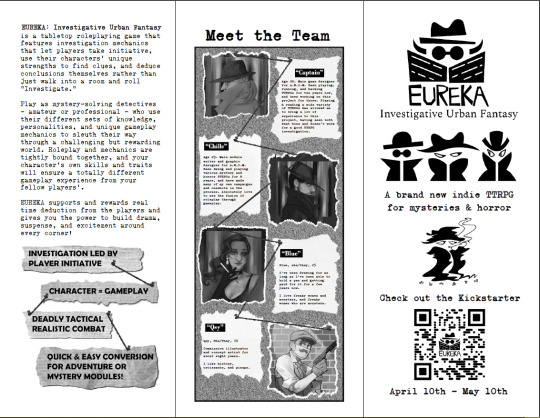
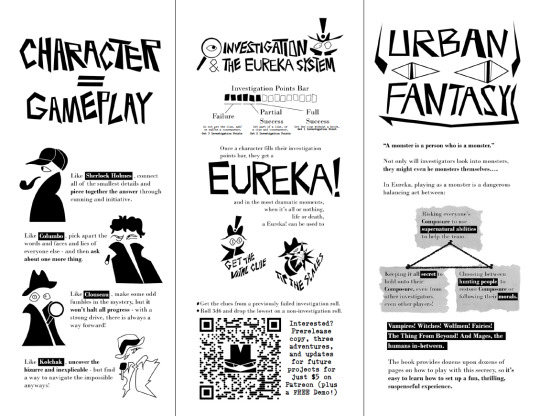
Interested in branching out but can’t get your group to play anything but D&D5e? Join us at the A.N.I.M. TTRPG Book Club, where we nominate, vote on, and play indie TTRPGs, all organized by our team with no strict schedule requirement! Here's the invite link! See you there!
We also have merchandise.

#eureka: investigative urban fantasy#ttrpg#rpg#roleplaying#eureka#tabletop#monsters#coc#allied forces#monsterhearts#pbta#powered by the apocalypse#motw#monster of the week#motw ttrpg#motw character#d&d 5e#d&d#dungeons and dragons#dnd#dnd5e#d&d5e#fighter#indie#indiegames#indie game#indie games#indie designer#ttrpg design#ttrpg community
376 notes
·
View notes
Text
I just published the ashcan of my mystery game about the chambermaids of a 19th century alpine hotel
You play as the chambermaids that investigate the disappearance of one of your own: Marga, the boyish girl with the wild curls. It'll be dangerous, sad and probably scary.
Download it on itch.



While it is still somewhat of a rough draft, it is complete and comes with everything you need to play.
I hope you check it out!
152 notes
·
View notes
Text
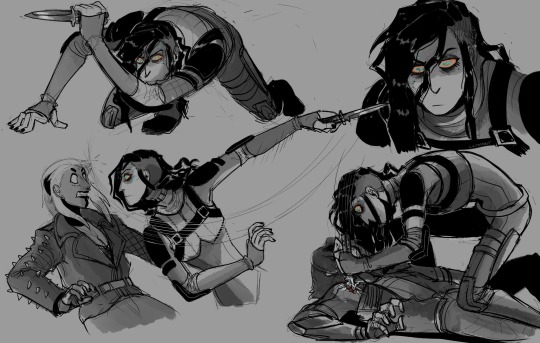
Had another session of Sprawl a couple nights ago.
For context, Kassidy has a chip in her head that allows the corp she works for (Manticorp) to hijack her and take control of her body to make her do jobs for them. (Which is insult to injury because if they just asked and paid her she’d still do it but this about taking away her autonomy) And the chip has consequences if she spills the details to anyone.
Needless to say, the work Manticorp is forcing her to do is overlapping with the party so she sucks it up and tells the them regardless of whatever pain it was gonna cause her… the chip immediately assumed control and made her watch as she's puppetted into was attacking the party. And Kass is unfortunately one of the two in the group who is built to deal damage. She was able to take control back just before she was about to kill the hacker, stabbing the shoulder instead of his heart.
Needless to say she's having a great time.
153 notes
·
View notes
Text
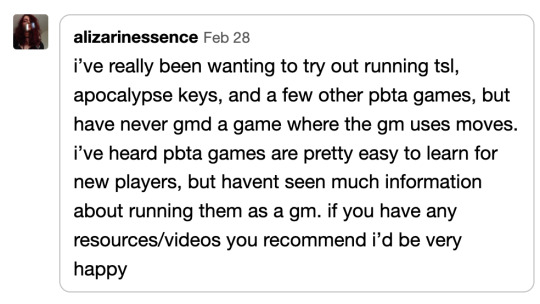
@alizarinessence thank you for your patience as I took my time to respond to you! PbtA games can be pretty daunting, and I certainly didn't understand how the play flow was supposed to work at first. I personally learned through trial and error, as well as watching other GMs who had figured it out - I am blessed to have a friend who is very experienced in running PbtA games so I was able to play in some of his games and ask him questions.
That being said, there have been a few things that I've also found helpful that I can refer to you, so I'm going to put them up here.
The Flow Chart
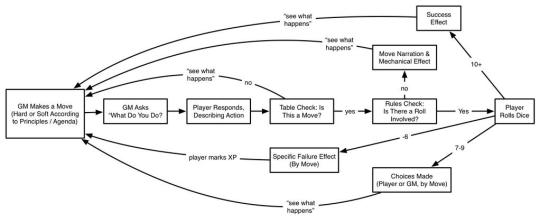
This flow chart was originally posted in a Dungeon World reddit post, and later referred to me when I started asking for PbtA advice. You'll likely see a similar flow chart in Apocalypse Keys, where Rae Nedjadi illustrates how a typical session of play is likely to look like.
In any given PbtA game, you as a GM are going to be presenting pieces of information to the players, just as you would in any other ttrpg. PbtA codifies this information as "moves," and each game will present you with information that is considered useful for the kind of story that it is design to tell.
In Masks, the players are teenage superheroes, so the game encourages the GM to introduce facts such as "civilians are in danger" or "your dad thinks you're being irresponsible."
In The Ward, the players are medical doctors in an Emergency Ward, so the game advises the GM to introduce truths such as "a patient's condition is worsening" or "someone's dad is fighting with a nurse in another room."
This reinforces the common maxim that the game is a conversation, a cycle of presenting new information, letting players decide what they want to do with that information, and making a roll if the fiction calls for it. This is a rather simplified cycle of course - the "see what happens" sections may include moments when players may jump in with their own characters' reactions, generating more events that the GM doesn't need to add to in order to make them interesting. Many PbtA games thrive off of player conflict, which can occupy the table for a couple of hours without the GM needing to add anything (Last Fleet is a good example of this kind of play.)
Listening to Others
Listening to other people play PbtA games can give you a sense of how the game is meant to feel, especially when the GM's and players take their time to talk through their moves and how they work.
I found Monster Hour to be exceptionally helpful; they started out as a Monster of the Week podcast, and even though I've never run MotW specifically, listening to Quinn talk the players through how to ask questions or use different moves made the game very easy for me to understand.
Joining a Community
Joining a community that loves a specific PbtA game, or PbtA games in general can be very helpful when seeking out advice. The PbtA Discord channel has a number of players and designers, who have a lot of game experience and are more than happy to dish out advice.
Start With Games That Have Guide-Rails
Not all PbtA games are created equal, and while the original spirit of the game was to make sure you didn't plot out a story-line, there's still some games that have a certain amount of prep that will give you the tools you need to gain confidence as a GM. Here's some of my favourites:
Visigoths vs. Mall Goths can be played as a one-shot, and doesn't require players to make a lot of decisions when putting their characters together. It has a number of scenarios that you can throw at your players, a mapped-out mall with details on all of the NPCs (and whether or not you can flirt with them), and some pretty hard limitations on what you can and cannot do. You can't leave the mall, for example - go through an exit on one side of the mall and you'll just pop back in on the other. You can visit the stores throughout the day, but each team of players can only go to so many places before the mall is closed for the day, therefore bringing the mission to a close.
Apocalypse Keys has a game structure that looks daunting but can be broken down into steps, and also comes with pre-written scenarios as well as instructions on how to create your own. The concept is pretty straightforward - you're solving a mystery, and you need to do it before one of the Doors of the Apocalypse is opened. This puts the game on a timer, which helps GMs keep their players on task, and also provides the Game Master with a list of clues to drop into the story as the players look for them. I've heard very good things about how Brindlewood Bay, which inspired some of the mechanics in Apocalypse Keys, makes itself easy to run for new GMs, so if you can get your hands on that book, you might find it helpful!
Last Fleet is laser-focused on a very specific premise - you are humans, in space, running away from a terrible and insidious threat. What is more, this threat has the ability to infiltrate your fleet. The laser-focus brings everyone at the table to the same page pretty quickly, and the setting includes a mounting pressure track that will make sure things keep happening, so as the person running the game, you won't have to do much after you set up the initial scenario. The game also comes with some really good advice on where you want to start with your players, to make sure they're on edge, but not fully panicking yet. Then you just need to tip the scales enough to cause them to ask questions, make questionable choices, and start a series of actions that snowball into catastrophe.
Wrapping Up
This is all the advice I have for stepping into PbtA, but more than anything, I recommend just diving in and giving it a go! As with any GM-ing endeavour, you will likely walk away from your first session with a list of things that you'll want to do differently the next time around, but that's just a sign that you're learning.
147 notes
·
View notes
Text

My character Amina who I played in a friend's Masks game. She's a Doomed hero cursed with lycanthropy, her curse is now in remission.




her and the fairy she pulled by being autistic.
#she experiences the horror but she persists#jolly's art#masks a new generation#masks rpg#superhero#ttrpg#pbta#powered by the apocalypse#digital art#artists on tumblr#sketch#art#oc#werewolf#lycanthrope#illustration#lesbian
119 notes
·
View notes
Text
Monsterhearts 2: Plotting Anti-Plot
Last week I had the fortune to MC (and play) Monsterhearts 2 for the first time as the Dream Library begins a unit on monsters, monstrosity, and monsterfucking which will carry us through November, and boy howdy am I glad we managed to do it.
For those who (somehow) don’t know, Monsterhearts is a game that bills itself as being about “the messy lives of teenage monsters.” It cites Twilight, Buffy, Ginger Snaps, The Vampire Diaries, and The Craft as media touchstones, it’s not joking when it says that these monsters are 1. messy and 2. teenagers. Monsterhearts is angsty, horny, frightening and, above all else, extremely fun to play. On top of that, Monsterhearts is also one of those games that, if you’re in a certain sector of the indie RPG scene, people will remind you is extremely fun to play all the fucking time. It feels sometimes like every designer I know has a good Monsterhearts story, and as much as Avery Alder’s reputation on a larger stage has been defined by The Quiet Year, I get the sense that for people who like what Monsterhearts is doing it’s an extremely hard game to beat.
So to be totally honest, I was more than a little anxious MCing for my first time actually playing the game. There’s a sense in which hosting a game which you know is great can be way harder than hosting games you think might be bad — after all, if the session goes poorly, there’s nobody to blame but yourself. On top of that, Monsterhearts moves through some tricky territory: underage sex is a core element of the game, and the eight “Small Towns” (short, pre-prepped settings for quick starting the game) all deal more or less explicitly with histories of racism and colonialism in communities across North America. While these are interesting places to go in play, the idea of taking them on myself as host made me shy away a little bit (and I’m excited in the next session to look at things from a player’s perspective).
All in all, though, I think the session was a resounding success. I went in with basically no prep and as much familiarity with the book as I could get (not enough to realize the quick reference sheet we were using for the first half of the session was from Monsterhearts 1, but so it goes), relying on the game itself — which leans away from strictly organized plots and encourages you, in true PBTA fashion, to let characters and their needs bounce off each other until the conversation goes somewhere interesting — to get us smoothly into play. I would call my efforts there a mixed success: while Avery has a real skill for writing pedagogically, giving you the explicit frameworks you need to get into play (if you’ve never begun a session of The Quiet Year by reading the rules book aloud to each other, you should go fix that now), the session was hampered a little by some awkward pacing and uncertainty: partially driven by my chronic tendency to waste time on slowly establishing things in one-shots rather than swinging as hard as I can in the first five minutes and letting the players lead from there and partially by player character relationships that lead to clear, decisive actions... which left one of our players bored at work while the other two went off adventuring. We ended up taking a moment, after returning from the normal mid-session bio-break, to chat and refocus ourselves, figuring out where we wanted to go and what we wanted to see in the last hour or so of the session, and then jumping back in and — thankfully — playing hard to reach a strong conclusion. In the end, I’m not interested in tracking down exactly where the first half of our session lost its footing (although I have some ideas for how I could have hit harder as an MC). I’m more interested in celebrating the way the table was able to come together, talk explicitly about what we wanted, and get the game somewhere satisfying for everyone involved. We closed on, among other things: an underwater fight between the Fairy (Mermaid?) Queen and a Kraken-Leviathan-Hellmonster, a throuple sneaking off from a beach party to hook up, and the messy end of a South Jersey summer (complete with a tsunami and a beached whale front of the boardwalk). It was a good time.
Most striking to me in this moment, however, is the way thinking about Monsterhearts as a plotless game positions both me as MC and the other players. It really speaks to the way that capital-T The capital-C Conversation works in Powered by the Apocalypse games (good ones, anyway) to let play flow not according to the rules of a paced narrative, but along lines of player interest and highly-charged emotional incident. It is, I think, part of what makes all the PBTA games we’ve played in the Dream Library sing (in no small part because we pruned the last unit and didn’t play any PBTA games I think are bad, but that’s a different conversation) and it suits this game — with it’s emphasis on sex and messy desire — extremely well. It also fits in nicely with a point I’ve heard a couple of people make recently: that thinking of RPGs as first and foremost collective narrative engines is, at the very least, a narrow view.
Anyway, this week I’m fortunate enough to be joined by a new host (hi @jdragsky) so I can check out MH as a player, then we’ve got a couple of two-shots planned for the end of the month before we move on to our next monstrously intimate game: Bluebeard’s Bride. You want in on an upcoming game? Have a link. You want to hear more about Monsterhearts? One of my players wrote up some of her thoughts as well.
Otherwise, well, get out of here. Scram.
#ttrpgs#rpgs#monsterhearts#monsterhearts 2#avery alder#the dream library#play report#powered by the apocalypse#ttrpg
63 notes
·
View notes
Text
If you want as a bonus you can tell me about how you started in the tags when you reblog I love hearing peoples’ TTRPG stories :)
#ttrpg#dnd#d&d#pathfinder#powered by the apocalypse#I’m genuinely really curious and was like hey now I can find out!#I’ve been at it for 10+ years if anyone was curious
1K notes
·
View notes
Text
To resist a compel, you need to roll your eyes and say "Well, that just happened!" so your GM cancels the plot point in shame.
292 notes
·
View notes
Text
Starting my motw campaign: "Hey, it might be cool to add political intrigue to the magical underworld."
Now, over a year in: "These are the factions that control the former united states."
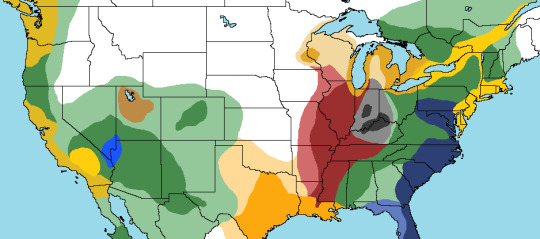
#motw campaign#motw ttrpg#motw rpg#motw#monster of the week#pbta#powered by the apocalypse#ttrpg#indie ttrpg#ttrpg community#rpg#ttrpg campaign#dnd#dnd campaign#alternate history#map#fantasy map#urban fantasy
313 notes
·
View notes
Text
Have you played DUNGEON BITCHES ?
By Emily Allen

Dungeon Bitches is a game wherein disaster-lesbians get Fucked Up in dungeons.
In Dungeon Bitches, the world is harsh and cold. “Polite” society has left you with no place, so you’ve struck out to find one of your own. Out into the dark cracks and forgotten margins. It’s not an easy life, but at least it won’t be a lonely one. Dungeon Bitches is a game about queer women banding together. It’s about trauma. It’s about community. It’s about pain. It’s about survival. But most of all, it’s very gay.
A Powered by the Apocalypse game that looks like a medieval riot grrrl zine and it owns
#ttrpg#tabletop rpg#poll#poll time#2020s#united kingdom#dungeon bitches#pbta#powered by the apocalypse
140 notes
·
View notes
Text
It's Disability Pride Month! I've already made a post spotlighting disabled creators. Now, let's have a post of accessibility aids for use within your gaming worlds!
Blades in the Dark: Mobility Equipment by Aurelia
Cost: PWYW
A collection of mobility items for Blades in the Dark, from a disabled creator. Two items for every playbook- well worth checking out!
Combat Wheelchair (5E) by Mark Thompson
Cost: free! Link is to google drive.
Here it is- the by now famous Combat Wheelchair! One of the best known mobility aids created for 5th edition Dungeons and Dragons.
Fate Accessibility Toolkit by Evil Hat
Cost: $7.50
This toolkit provides tools for representing disabilities within Fate games, as well as advice for supporting players with disabilities at your table. It was put together by a team of disabled creatives, so you know this was made with love and from real people's experiences.
Homebrew Disability Systems for 5E by harpoon_gun
Cost: PWYW
Highly rated set of mechanics for 5th edition Dungeons and Dragons, brought to you by a disabled creator. Useful for both NPCs and player characters.
Service Monsters (5E) by PsychHound
Cost: PWYW
Service monsters to aid your disabled characters in 5th edition Dungeons and Dragons! There are multiple options to choose from (including guide, medical alert and autism support monsters), each with unique traits supporting their role. There are also a bunch of backstory ideas, to inspire the story of how your service monster came to be in your service!
(PsychHound has also created trauma mechanics and mechanics for autism and ADHD! The latter is informed by his own experiences as an autistic social worker.)
We Are Still Here by Ennis Rook Bashe
Cost: PWYW
Mobility aids and medications suitable for use in Apocalypse World and many other Powered by the Apocalypse games. Very highly rated by the Itch community!
#disability pride month#accessible ttrpg#blades in the dark#dungeons and dragons#powered by the apocalypse#fate rpg
67 notes
·
View notes